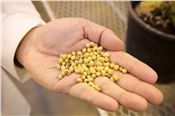Missouri Foundation Seed planted for growth Modernization project is underway

COLUMBIA, MISSOURI
Missouri Foundation Seed was established in 1944 as an avenue for the University of Missouri to take new plant breeds created by CAFNR researchers to market while also providing the highest quality seeds to Missouri farmers. Thanks to new funding from the state of Missouri, it has the opportunity to thrive.
“Foundation Seed hasn’t seen anything like this ever,” said Jeffrey McHugh, director of Missouri Foundation Seed. “It’s always been sweat equity.”
McHugh is new to Missouri Foundation Seed, but he is no stranger to the University of Missouri. His BS (Biology) and MS (Plant, Insect and Microbial Sciences) were both earned at Mizzou, and he worked as a research specialist at Missouri Foundation Seed for nine months prior to being named director. McHugh also came to Missouri Foundation Seed with expertise gained while serving as an extension assistant for the University of Tennessee.
McHugh hopes to use the unprecedented $3.25 million state appropriation to breathe new life into the organization. The Missouri Soybean Association was instrumental in making the state appropriation a reality.
“We are so fortunate to have great partners like the Missouri Soybean Association and industry leaders and legislators to advocate for us,” said Shibu Jose, associate dean for research, College of Agriculture, Food and Natural Resources, and director, Missouri Agricultural Experiment Station. “We are so grateful for their support. The new funding for the Missouri Foundation Seed will help revolutionize the way we do business.”
McHugh’s plans include an overall modernization of the seed processing plant and field equipment, introducing new varieties of seeds, and establishing a web presence to make shopping for the seeds more convenient for farmers in Missouri and beyond.
The new website is already underway and will be a part of the Missouri Agricultural Experiment Station website.
Currently, Missouri Foundation Seed offers 26 varieties of soybean seeds and five varieties of wheat seeds to farmers, and most of these seeds are conventional varieties. McHugh wants to better meet the needs of modern farmers by adding new varieties as well as expanding offerings to include a variety of cover crops.
The first of these new varieties is already underway, and it is a high oleic — containing higher oil content — soybean seed produced as a part of Missouri Foundation Seed’s partnership with Missouri Soybean Association. The high oleic soybean, “SOYLEIC,” is a non-GMO, high-oleic soybean that resulted from the breeding program of Shannon Grover at the Fisher Delta Research, Extension and Education Center. Grover then partnered with Kristin Bilyeu, a US Department of Agriculture (USDA) molecular geneticist, to evaluate the importance of a non-GMO high oleic trait. This variety will be the first available for online purchase.
In addition to offering new varieties of seed developed by CAFNR researchers, all seeds sold through Missouri Foundation Seed go through a rigorous certification process to ensure quality.
“Foundation seeds are the highest quality seeds you can get,” McHugh said.
Missouri Foundation Seed is located at South Farm, a 1,452 acre research farm just south of Columbia that is part of the Central Missouri Research, Extension and Education Center. Originally established in a partnership between the University of Missouri and the Missouri Crop Improvement Association, the project was turned over to the University of Missouri in 1962. ∆